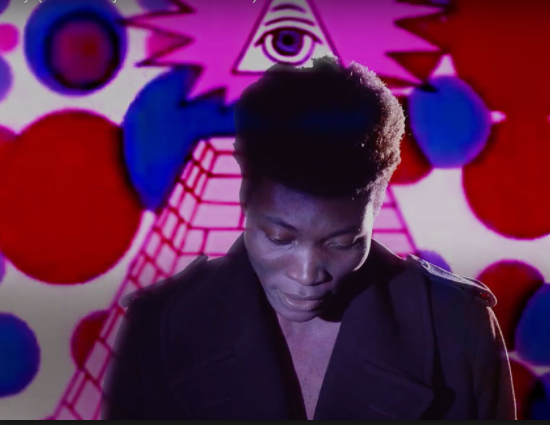To say that the Gorillaz have been keeping many in anticipation of their first album since 2010’s Plastic Beach would be the pinnacle of understatement. But the timeliness of “Hallelujah Money” seems to have been the perfect moment to at last release a new single apropos of America’s impending new regime, run by a monger of many things–money just one of them. As a collaboration with Montmartre-originated baroque pop artist Benjamin Clementine, the video, like its accompanying song is nothing if not extremely sinister–a warning, of sorts, but also perhaps a portrait of things as they are in the present.
With Gorillaz occupying a fucked up futuristic currency, the video–directed by Giorgio Testi and Gorillaz–segues into a shot of Clementine all alone in a gold room as strategic images are projected behind him, the first being the movement of a white man’s hands that are made to look like a puppeteer pulling the invisible strings of Clementine in front of him. Referring metaphorically to a need to protect “our tree,” Clementine embodies the mindset of a Trump-like figure determined to build walls around it, remarking, “I thought the best way to perfect our tree is by building walls/Walls like unicorns/In full glory, and galore/And even stronger than the walls of Jericho.” Right at this very moment in the video, a typically haunting image of the KKK marching behind Clementine appears. This ominous depiction, unfortunately, doesn’t feel like hyperbole when looking back to some of Trump’s more notorious sound bites, in addition to looking at the militant constituency that wanted him to win for this very platform of separation.
Unlike other bands that have released politically-infused albums of late–Austra being the most obvious example–Gorillaz don’t exactly offer a positive outlook, shrugging, “Don’t worry my friend / If this be the end, then so shall it be.” The now portentous seeming colors of red, white and blue burst forth behind Clementine, the emblematic money pyramid on the back of dollar bills also making an equally as foreboding cameo. In spoken verse, and with a horrified trio of tortured souls behind him, Clementine calmly reads, as though from the book he’s holding, “Ah, don’t worry/It’s not against our morals/It’s legal tender.” This sense of sardonicness is not only increasingly rare, but admirable in an era when to joke with any sort of irony is either misunderstood or chastised. That satire picks up as Clementine makes the signature motion of rubbing his fingers together to indicate the universal sign for “money” while animated imagery of birds and rainbows crop up in sharp contrast to that which we have seen before up until now. And who else but Clint Eastwood (harkening back to the band’s first single) in his prime materializes, riding around in all his Western glory?
Reaching its visual and sonic crescendo, red, white and blue stars paired with Liberty Bell ringing jauntily bring Clementine’s false praise of a false god to its zenith. Money is not a new god, but, of late, it has shown itself to be the most powerful. And with Trump as its willing funnel into the reigning Supreme of the twenty-first century, it’s no wonder Clementine starts to look possessed toward the end of the video–which abruptly concludes with even SpongeBob Squarepants running for his life.
And so, offering a fitting question on the eve of Donald Trump’s inauguration, Damon Albarn asks, “How will we know/When the morning comes/We are still humans/How will we know?” The answer, perhaps, will be contained within the protests to come, and the persistence of a population now more than ever called upon to express its First Amendment rights, which cannot, contrary to the unpopular businessman’s belief, be bought off with that idol, money (no matter how much he puts into Facebook ads for his inauguration party).
Praise be not to money.



















